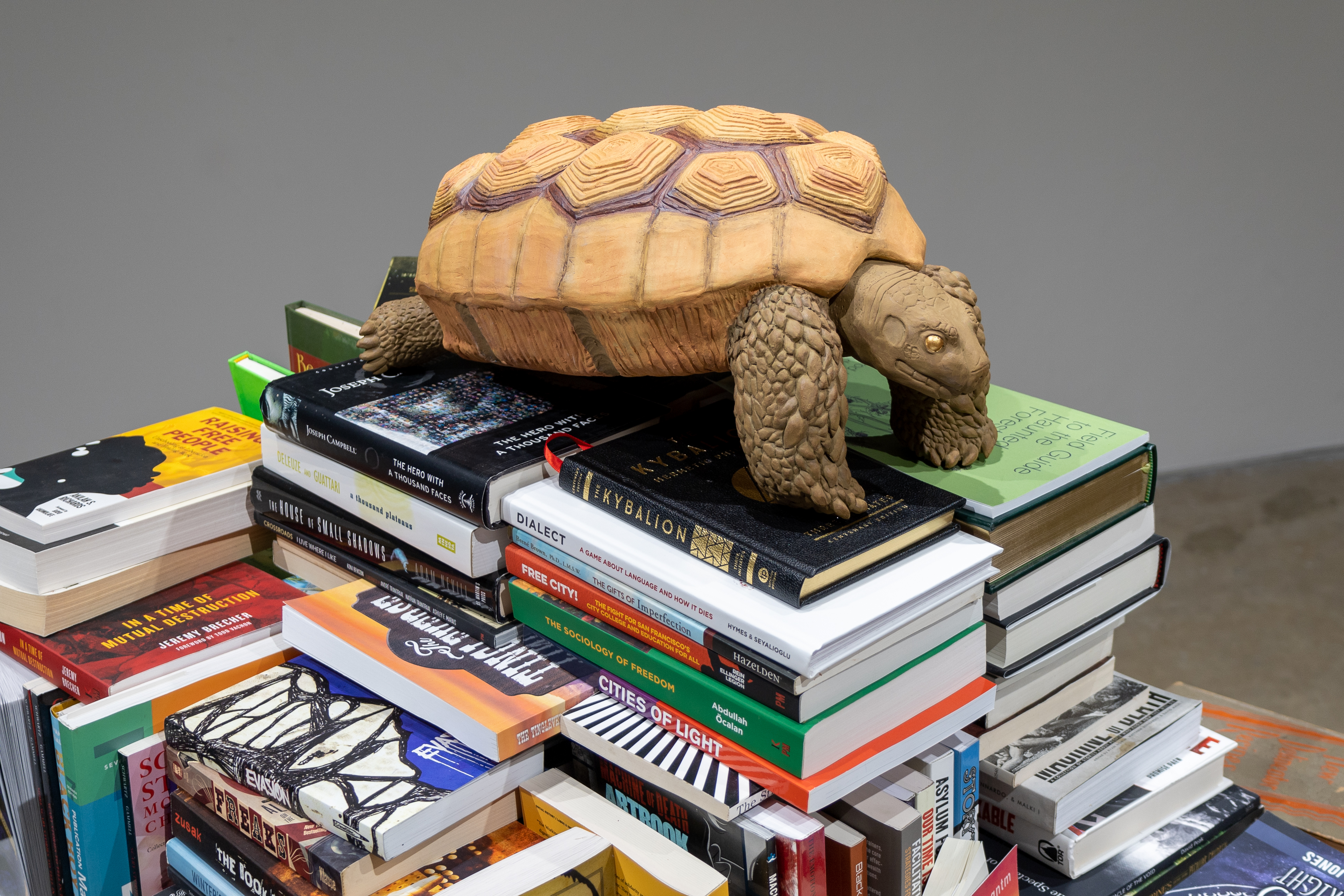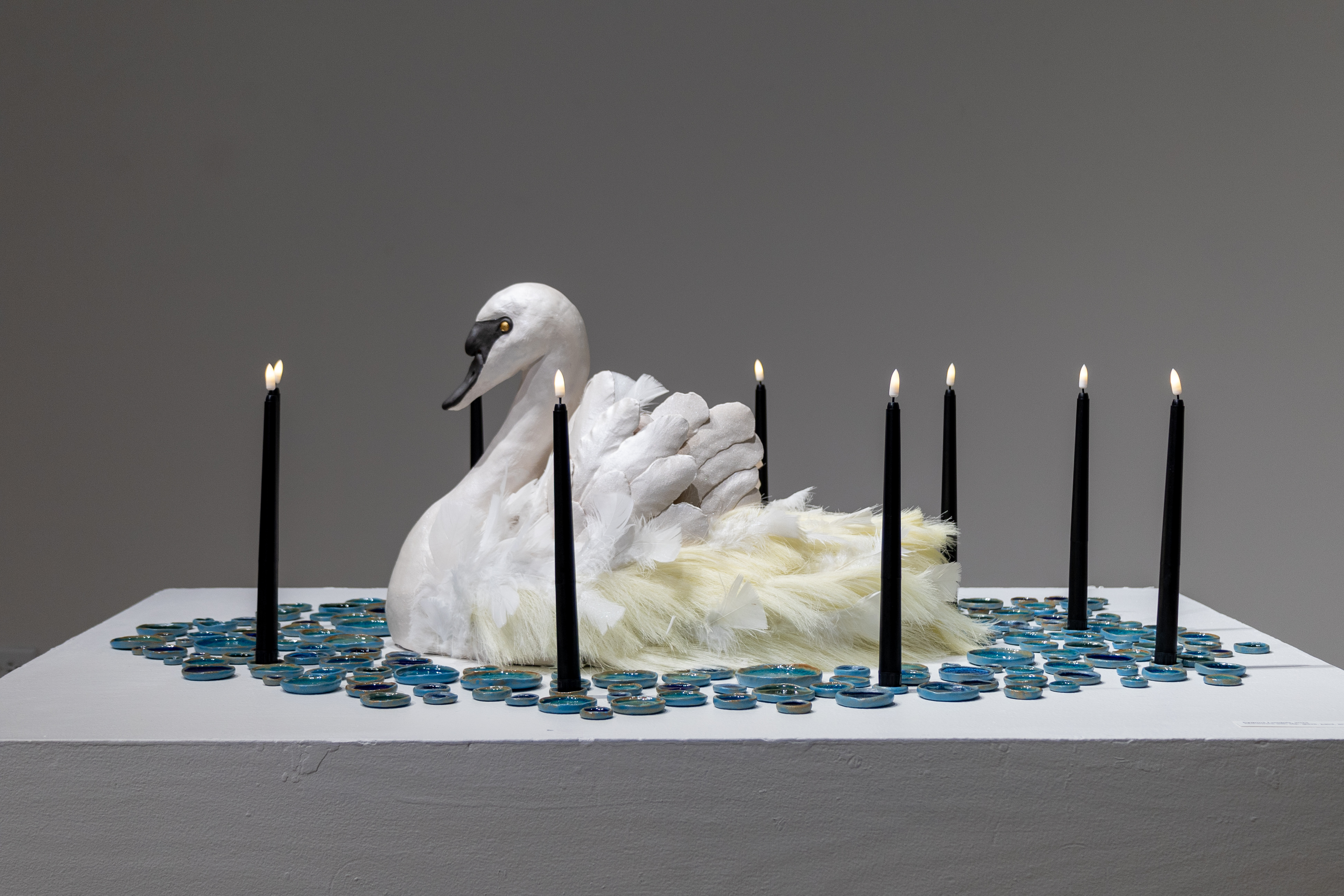NERON SIMPSON
Special to The Leader

Chelys Callida, 2023. Stoneware with slip, paint, and found book collection. Photo By Drew Paluch | Photo Editor
A presence can be significant. It can be impactful, but can it be nothing?
The environment in which one enters plays a role in their perception and implicates them in any preceding events.
In “Bell, Book and Candle,” visiting professor of ceramics Allora McCullough explores the theme of intention. Through her sculptures, she initiates a space of renewal, invitation and an escape from the minutiae and routine of everyday life.
Upon entering, one lays face to face with “Ursa Tanta” (2023), a large ceramic black bear with golden claws, golden eyes and a golden bell with bright red string hanging from its left paw. I drew similarities between the bear and the “ideal” young student. Their paw was raised, as if wanting to ask or answer a question, gold details to indicate recognition of accuracy or correctness (gold stars/stickers) and an eagerness in the eyes. The bear radiated a sense of curiosity, learning and wonder.
Walking over to “Chelys Callida” (2023), one is exposed to a vibrant orange-shelled tortoise, sitting atop a mountain of literature. With a life expectancy of 80 to 150 years, tortoises have been mythologized as keepers of sacred knowledge.
In this context, this knowledge ranged from iconic titles such as “A Wrinkle in Time,” instructional texts like “How to Draw the Human Figure” and modern cult-classics like “Scott Pilgrim.” The multifacetedness of knowledge was refreshing, and helps remind visitors that knowledge is not monolithic, and that being open to learning from sources unfamiliar to us can reveal unique points-of-view that can help us along our journeys, whatever that may mean to each of us.
“Cygnus Luminis” (2023), the final sculpture, felt like a dream. A white-feathered, black-billed swan surrounded by rippled water and black candles emitted a feeling of ceremony and introspection. The swan could be meeting someone, as swans are social animals. It could be looking for its cygnet (baby swan). It could also be meeting its fate.
Fate is not inherently dooming though.
One could feel a sense of mystique watching the swan, waiting for its next move. Waiting is inherent to the human experience. One must wait for answers, wait for transportation, wait for others. In all those times of waiting, when is one allowed to just be?
“Bell, Book and Candle” is on view in the Emmitt Christian Gallery in Rockefeller Arts Center 227 until April 27. Open hours are Monday-Friday 8 a.m. to 4:30 p.m.
All works in the exhibit are for sale. Interested buyers can contact Allora via email at beawestruck@gmail.com or through her website at www.beawestruck.com.

Ursa Tanta, 2023. Stoneware with slip, paint, and brass bell. Photo by Drew Paluch | Photo Editor
Q+A with Allora McCullough, Visiting Professor of Ceramics
Neron Simpson (NS): Bears symbolize different meanings in different cultures. Did you reference a specific type of bear and if so, why that one?
Allora McCullough (AM): “For the past ten years of my life, I’ve lived in different parts of the Appalachian and Adirondack mountain ranges. Black bears are native to these areas, and I’ve personally seen one on a hike. My sculpture is a direct life-size scale of a female black bear measuring four feet long from nose to tail.”
NS: For the tortoise sculpture, did you have specific books you wanted to showcase when building the mound? Were there any titles you wanted viewers to think about?
AM: “All of the books included in this installation belong to my partner and me. There are a variety of genres from art to comics, philosophy to religion, and social justice to science fiction. The most precious book in the stack is my late grandmother’s cookbook with handwritten recipes and notes. I definitely considered which titles would be visible as I arranged the collection. I hope everyone viewing it finds something of interest.”
NS: Swans are usually seen as graceful, elegant and refined. The swan in your exhibit has frayed feathers, and seems lost in thought. What does this symbolize?
AM: “One part of my intention with this exhibit was to create a gathering place for people. I want it to attract viewers in the way an interesting party might intrigue passersby. Swans raise their wings and ruffle their feathers when engaged in a mating dance, as a way to attract attention. The swan is dancing as if arriving at a party and is garnering attention. I see it as a welcoming omen of good things to come and as an invitation to enjoy the space.”
NS: The scientific names attached to each piece seem to be fictional species. What was the process of coming up with them? And why were those names chosen?
AM: “All of the species included are real animals: the American Black Bear, Sulcata Tortoise and Trumpeter Swan. The Latin titles I gave each piece are a clue to research, but I won’t give them away. The translations of those titles reveal adjectives describing the scene and personality traits I attributed to the animals.”
NS: What was your favorite piece to work on?
AM: “This is a difficult question because it is like asking a parent to choose a favorite child. Each piece presented different challenges to solve and different ways of working with clay and ceramic materials. There are parts of the process that I enjoy more than others, but in the end I find them all very satisfying. Building large is exciting but it takes a long time. Small details and complex textures can draw me in for hours without realizing it. Mixed media application creates new results that are enthralling to realize. Every animal offered me a different experience in working on it, and I appreciate them in different ways.”

Cygnus Luminis, 2023. Stoneware with slip, glaze, paint, and electric candles. Photo by Drew Paluch | Photo Editor
